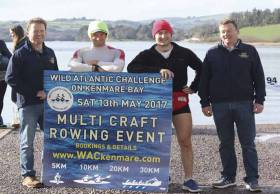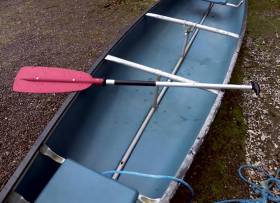Displaying items by tag: Kenmare Bay
TY Students Urge Oireachtas Members To Protect Kerry's Kenmare Bay
Transition year students from a Kerry secondary school have urged the Government to take action to end “unsustainable pair trawling” in Kenmare Bay.
The students from Pobalscoil Inbhear Scéine Kenmare, Co Kerry had been invited to the Oireachtas on Wednesday, February 28th, where a delegation from the National Inshore Fishermen’s Association (NIFA) was making the key presentation.
They were accompanied by environmental scientist Rachel Hawker.
Speaking on behalf of her fellow students, Kate McGann said they had travelled to Dublin “ in the hope of protecting our bay as it is a major part of life for all in Kenmare, providing livelihoods and promoting tourism”.
“Indeed, the very name- ‘Inbhear Scéine’ comes from the old Irish for Kenmare River,” she said.
 The students from Pobalscoil Inbhear Scéine Kenmare, Co Kerry meet Marine Minister Charlie McConalogue Photo: Rachel Hawker
The students from Pobalscoil Inbhear Scéine Kenmare, Co Kerry meet Marine Minister Charlie McConalogue Photo: Rachel Hawker
“As has been stated numerous times already today, unsustainable pair trawling carried out by vessels greater than 18 metres in overall length and within six nautical miles of the coastline has a variety of disastrous impacts, and in Kenmare we can clearly attest to the damage it has caused including a devastating depletion of fish stocks, and a complete destruction of the marine food chain,” she said.
She recalled how TY students had held a workshop with members of NIFA earlier in February, where the students heard how unsustainable trawling had affected their earnings.
 Kerry TY Student Kate McGann making a presentation to members of the Oireachtas, along with a delegation from the National Inshore Fishermen’s Association
Kerry TY Student Kate McGann making a presentation to members of the Oireachtas, along with a delegation from the National Inshore Fishermen’s Association
“Each and every one of the people in attendance [at the workshop ] also attested that they have seen a decline in marine life over the last number of years, lamenting about how in the past there used be a great number of dolphins, seals, sea bass and sea trout in the bay but that is no more,”she said.
“Participants stated that they had, quote: “watched with dismay at the wildlife has all but disappeared since pair trawling commenced”, and that they “have to go further and further out to see to catch fewer and smaller fish”,”she continued.
“ The anger in the room was palpable that such destruction has been allowed to occur in the first place. One participant stated that the trawling gives, quote: “no future for our children to throw a line out or learn even about the nature that we once had”. I have the same fear,” McGann said.
“As a 16-year-old looking towards the future I would love to imagine a life in Kenmare- a vibrant town, full of life, but truthfully, if we do not make some change to protect Kenmare Bay this just won't be possible,”she said.
“ Just a quick Google search will tell you that up to 30 restaurants and 17 hotels along with many more businesses rely on the health of the bay to promote tourism. If the marine ecosystem within the Kenmare Bay is pushed beyond a point where recovery is possible, what future will there be in a small coastal town for people like my classmates and I?,”she said.
“To give an example, a number of years ago, there was a festival hosted in our town celebrating the fruits of the sea. This festival could not be held today due to the declines in both the numbers and variety of fish to be found in Kenmare Bay,”she said.
“If the tide is not turned, generations to come will not have the idyllic childhood we have had, spending summers fishing off the bridge with my cousins or swimming from Kenmare pier with my friends because of the selfish ways of the generations before us,”she continued.
“We have tried to act and make people more aware of the wanton destruction of marine environments that is taking place across the country, but we alone cannot drive change. It is people like you here today who need to see what is wrong, act and make a real difference to our world and our future,”she told members of the Oireachtas.
She quoted the Norwegian playwright Henrik Ibsen, who wrote “one of these days the younger generation will come knocking at my door”.
“The future is knocking at our door right now. Make no mistake - MY generation will ask one of these two questions,” she said.
The first question would be “what were you thinking, and why didn't you act?,” she said.
“Or we will ask instead how did you find the moral courage to rise and successfully resolve this crisis?”
“We have everything we need to make a change, save perhaps political will, but political will is a renewable resource,” she said.
So, let us renew it and take real action that will lead to real changes and make a real difference,” she concluded, urging the politicians “find the moral courage to use your influence and make a real change today” for the sake of her generation.
Date Is Set for 2023’s Bull Run for Fun
Saturday 22 July is the date to mark in your diaries for this year’s Bull Run for Fun.
Organisers are hoping to best 2022’s turnout of 47 boats from around Ireland, ranging from a 5m open rib to a 1450 Redbay Stormforce, that came together in Kenmare for Europe’s most westerly RIB rally.
Boats will set out on the 90-nautical mile run from Dromquinna to the Bull Rock and back via Dursey Sound, Skellig Michael and other landmarks of the wild Atlantic coast.
Already more than 37 RIBs and other boats are registered and places are filling up fast, making great progress towards breaking the 50-boat mark this year. Email [email protected] to register your spot.
New Coastal Rowing 'Wild Atlantic Challenge' on Kenmare Bay
WAC (Wild Atlantic Challenge) Kenmare is a new coastal rowing event taking place on Saturday, 13th May on Kenmare Bay. It is a multi–craft rowing event for competitors of all abilities, with a distance to suit your crew and boat.
Whether you are a 30km Titan or a 5km fledgling, the organisers are inviting all comers to experience the challenge of the bay and the beauty of the sheltered Kenmare coastline, encompassing both the Beara and Iveragh peninsulas.
'We would also very much welcome Master or recreational rowers to make this a great event', says organiser Mike Donovan.
More details attached on the PDF flyer for download below.
Basic Safety Measures Not Taken Ahead Of Kenmare Canoe Drowning - MCIB
#MCIB - Basic water safety precautions were not taken before a canoe capsize incident that led to the drowning of a man off Kenmare almost a year ago.
That’s the main conclusion of the official report into the tragedy in Kenmare Bay in which local man Bill Topham died, as previously reported on Afloat.ie.
Topham had been canoeing to islands in Kenmare Bay with a friend for a duck shoot when their two-man vessel overturned in high winds on the afternoon of 31 January 2016.
The Marine Casualty Investigation Board report identified that neither passenger on the canoe was wearing a personal flotation device.
It also concluded that their decision to undertake their trip amid adverse weather conditions with a fully laden canoe, including two boisterous dogs, greatly increased the “inevitable element of natural risk” involved.
The full MCIB report into the incident is available to download below.






























































